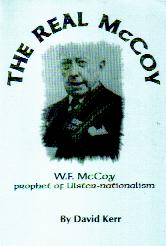The Real McCoy. W F McCoy: prophet
of Ulster-nationalism. 
David Kerr.
Third Way Publications, Belfast 2000. ISBN 0 9535 0778 5. £2.00.
At first glance, this short booklet is simply the biography of a little known Stormont Unionist MP from the post war period. However the fundamental issue that William McCoy raised in the late 1940's and early 1950's is even more important and remains unaddressed by unionists today, in the early years of the 21st century. "Union" assumes an equal commitment by both parties, but it has become increasingly clear over the past 33 years that the commitment of the majority population of Northern Ireland is much stronger than that of successive British governments. The one sidedness of the union was made explicitly clear in 1990 when the then Conservative Northern Ireland Minister Peter Brooke announced that "The British Government has no selfish or strategic or economic interest in Northern Ireland". Rather than a committed partner to the union, it saw its role as merely acting as a referee between two rival tribes.
William McCoy was one of the first to identify this fatal flaw in unionism. In the post war years he argued at Unionist and Orange meetings, and in the press, that the union was not one made between two equal parties. Just as Westminster had created Northern Ireland, so could it legislate it out of existence, with the population of the province denied any right to self determination in the process. The powers of the Stormont Government were also heavily curtailed, depriving the elected representatives of the people of Northern Ireland any real influence in the development of their state. Ultimate control remained with Westminster.
McCoy's solution was to propose Dominion status within the Commonwealth for Northern Ireland, similar to that enjoyed by Australia, Canada, New Zealand and South Africa. The Sovereign remained the head of state, but national parliaments had the independence to govern themselves as they saw fit.
The response to McCoy's proposals gives an important insight into the shortcomings of Northern Irelands Unionist establishment. They had no conception of the idea that Britain would ever betray them. They belittled and silenced McCoy and his ideas, unwavering in their belief that the union and the status quo they enjoyed would continue for ever.
Looking back in hindsight, it is possible to see how the amateurism, complacency and naïveté which typified the establishment, unable to deal with debate within Unionism, also rendered it unable to deal with challenges from outside. Its inability to peacefully resolve the issues raised by the civil rights movement led Northern Ireland on its descent into chaos after 1969 and subsequently to its own dissolution by the Westminster government in 1972, just as McCoy had foretold.
An appendix to the booklet is an article by McCoy published in 1973 in which he recounts his struggle for Dominion status. He interestingly mentions the parallels with Canada, which had achieved Dominion Status and successfully overcome through constitutional change the challenge of a large section of its population in Quebec who sought separation.
This reviewer’s only doubt about McCoy’s proposals of 1947 is a historical what if? Would his Dominion of Northern Ireland have been an equally unsuccessful ‘Protestant state for a Protestant people’ as Stormont, ultimately arriving at the tragedy of 1969 along a different path. Clearly by 1973 he had realised the need for accommodation with Northern Ireland's minority community. Would his proposed Dominion Parliament have arrived at that conclusion before the country was already on the brink of the abyss?
This booklet provides a fresh historical perspective on the history of the Northern Ireland state, and is a useful contribution to the debate on self determination. What we must add to that debate is our knowledge of the events of the past 33 years, in the search for a viable long term solution.
David N
home page